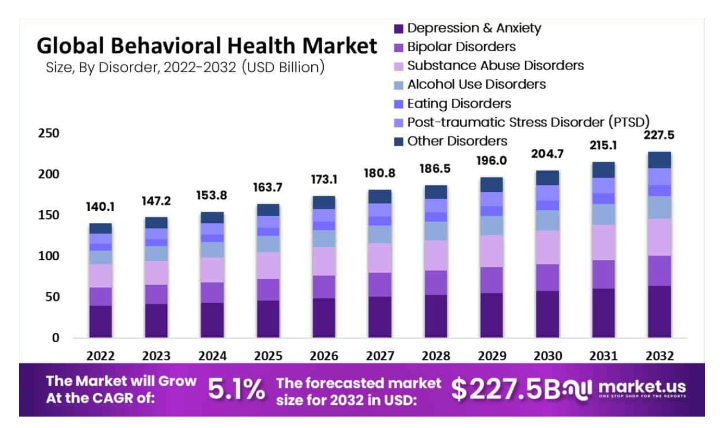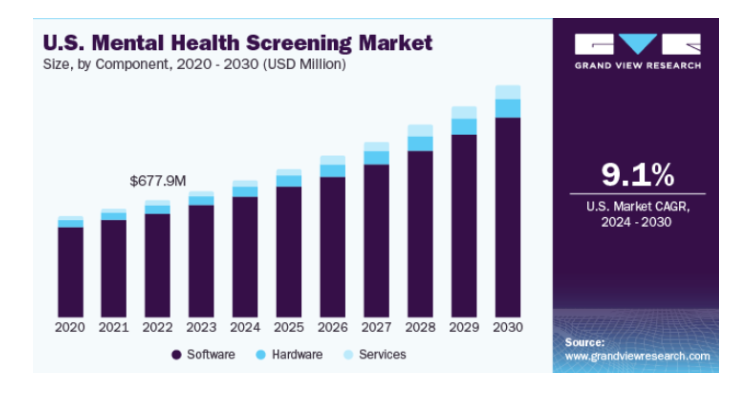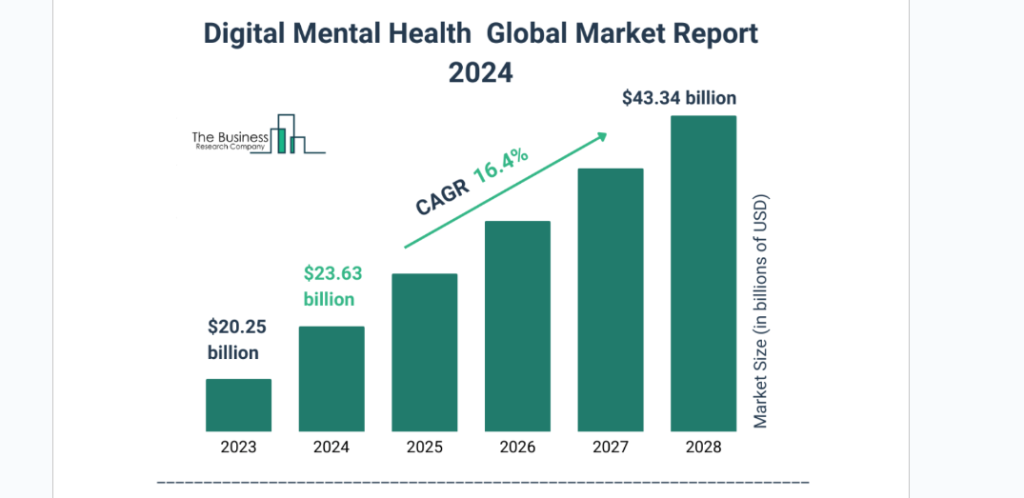According to the US Department of Labor, untreated serious mental illness results in over $193 billion in lost earnings each year.
In today’s rapidly changing world, marked by technological advancements, political uncertainties, economic fluctuations, and ecological degradation, the need for accessible mental health services has never been more critical. As we navigate through these disruptive times, the demand for immediate mental health support is surging, presenting both challenges and opportunities for investors and healthcare providers alike.
The Current State of American Mental Health
Recent statistics paint a sobering picture of the mental health landscape in the United States:
- Approximately 52.8 million adults experienced Any Mental Illness (AMI) in 2021, with only about half receiving mental health services.
- The global AI in Mental Health Market is projected to grow from $0.92 Billion in 2023 to $14.89 Billion by 2033, at a CAGR of 32.1%.
- One in eight people worldwide lives with a mental disorder, totaling around 970 million people.
These numbers underscore the vast and growing need for mental health services, particularly those that offer immediate access to care.
The Impact of Disruption on Mental Health
The ongoing disruptions in various sectors of society have significantly contributed to the rising demand for mental health services:
Technological Disruption
The rapid pace of technological change has led to increased stress and anxiety for many individuals. While technology has improved access to mental health resources, it has also created new challenges:
- The mental health app market was valued at $500 million in 2020 and is expected to grow significantly.
- 75% of mental health providers now offer tele-therapy services.
Political Uncertainty
Political polarization and global tensions have contributed to heightened stress levels:
- Issues such as political polarization and economic instability are creating significant stress for many Americans.
- Uneasy feeling and anxiety regarding upcoming election results and potential fallout on either side.
Economic Fluctuations
Economic instability has a direct impact on mental health:
- 21.6% of adults working full-time have experienced symptoms of mental illness within a one-year period, compared to 32.2% of those who are unemployed.
- Untreated serious mental illness results in over $193 billion in lost earnings each year.
Ecological Degradation
The “Doom Loop” of global climate change, water scarcity, land destruction and more has a direct impact on mental health:
- 7% of American adults are experiencing at least mild levels of climate change psychological distress (CCPD), and 68% of U.S. adults have reported having at least some anxiety about climate change, indicating a widespread mental health impact even among those who haven’t personally experienced climate-related disasters.
- A study of 10,000 children and young people across 10 countries found that 45% of respondents said their feelings about climate change negatively impacted their daily functioning.

According to the US Department of Labor, untreated serious mental illness results in over $193 billion in lost earnings each year.
The Growing Demand for Immediate Access
The need for immediate access to mental health services is becoming increasingly apparent:
- In 2021, over 6.6 million hospital emergency department visits were related to mental health or substance use.
- The 988 Suicide & Crisis Lifeline has received over ten million calls since its launch in 2023.
- Reported that over 300,000 of those calls were forwarded to 911.
- Out of pocket payments on the rise as workers lose insurance.
This demand is driving innovation in the mental health sector, with digital health solutions and AI-powered tools emerging as key areas of growth and investment.
Investment Opportunities in Digital Mental Health
For Family Offices, RIAs, Accredited Investors, and Multi-strategy funds, the growing demand for immediate mental health services presents compelling investment opportunities:
- Digital health funding in Q2 2024 finished strong, with startups raising $5.7 billion in H1 2024.
- 1 in 3 dollars invested in H1 2024 went to digital health startups leveraging AI.
- The mental health app market is experiencing rapid growth, with 40% of users adopting these digital solutions.

The Legacy Lifeline Foundation Initiative
In response to this growing need, initiatives like the Legacy Lifeline Foundation are pioneering innovative approaches to mental health support. By partnering with the film industry and digital health providers, they’re creating a unique model that combines awareness-raising with immediate access to care. This approach not only addresses the urgent need for mental health services but also aligns with the growing trend of impact investing, allowing investors to support social causes while potentially generating returns.
PRESS RELEASE: Award-winning Film Launches Mental Health Initiative Alongside Spyral Documentary
Wrap Up
As we continue to navigate through these disruptive times, the demand for immediate mental health services is only expected to grow. For investors, this presents an opportunity to not only capitalize on a rapidly expanding market but also to make a significant positive impact on society. By investing in digital health solutions, AI-powered mental health tools, and innovative models like the Legacy Lifeline Foundation, investors can position themselves at the forefront of a critical and growing sector while contributing to the well-being of millions. In a world where disruption has become the norm, supporting and investing in mental health services isn’t just good business—it’s essential for building a resilient and thriving society.

